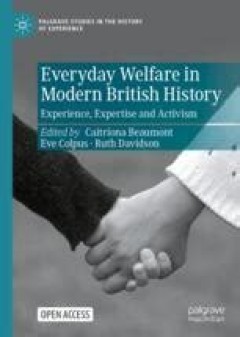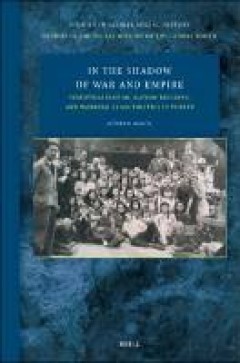Filter by

A Global Radical Waterfront; The International Propaganda Committee of Transp…
This volume investigates the ambition of the Red International of Labour Unions to radicalize the global waterfront during the interwar period. The main vehicle was the International Propaganda Committee of Transport Workers, replaced in 1930 by the International of Seamen and Harbour Workers as well as their agitation and propaganda centres, the International Harbour Bureaus and the Internatio…
- Edition
- Volume: 43
- ISBN/ISSN
- 9789004463288
- Collation
- 524 hlm
- Series Title
- -
- Call Number
- -

«A Marvellous and Strange Event» Racconti di nascite mostruose nell'Inghil…
In early modern England, the birth of a human being with congenital physical deformities was an event which aroused horror and fascination, disgust and morbid curiosity. In a time when modern science was taking its first steps, this kind of prodigy sometimes appeared as a sort of divine punishment for a moral fault, sometimes as a bizarre pastime, or political weapon, or a pre-medical investiga…
- Edition
- -
- ISBN/ISSN
- 9788864533452
- Collation
- oer.unej.ac.id
- Series Title
- Premio Tesi di Dottorato,
- Call Number
- -

Child Protection in England, 1960–2000
This book is open access under a CC BY 4.0 license. This open access book explores how children, parents, and survivors reshaped the politics of child protection in late twentieth-century England. Activism by these groups, often manifested in small voluntary organisations, drew upon and constructed an expertise grounded in experience and emotion that supported, challenged, and subverted…
- Edition
- -
- ISBN/ISSN
- 978-3-319-94718-1
- Collation
- oer.unej.ac.id
- Series Title
- Palgrave Studies in the History of Childhood
- Call Number
- -

Bearing Witness
This open access book is the biography of one of Britain’s foremost animal welfare campaigners and of the world of activism, science, and politics she inhabited. In 1964, Ruth Harrison’s bestseller Animal Machines triggered a gear change in modern animal protection by popularising the term ‘factory farming’ alongside a new way of thinking about animal welfare. Here, historian Claas …
- Edition
- 1
- ISBN/ISSN
- 978-3-030-62792-8
- Collation
- oer.unej.ac.id
- Series Title
- Palgrave Studies in the History of Social Movements
- Call Number
- -

Everyday Welfare in Modern British History : Experience, Expertise and Activism
This open access book offers a new approach to understandings of welfare in modern Britain. Foregrounding the agency individuals and groups claimed through experiential expertise, it traces deep connections between personal experience, welfare, and activism across diverse settings in modern Britain. The experiential experts studied in this collection include women, students, children, women who…
- Edition
- 1
- ISBN/ISSN
- 9783031649875
- Collation
- XV, 381 hlm,: ill, lamp;
- Series Title
- -
- Call Number
- -

International Impacts on Social Policy = Short Histories in Global Perspective
This open access book consists of 39 short essays that exemplify how interactions between inter- and trans-national interdependencies and domestic factors have shaped the dynamics of social policy in various parts of the world at different points in time. Each chapter highlights a specific type of interdependence which has been identified to provide us with a nuanced understanding of specific s…
- Edition
- 1
- ISBN/ISSN
- 9783030866457
- Collation
- XXVIII, 542 ill; hlm
- Series Title
- -
- Call Number
- -

In the Shadow of War and Empire : Industrialisation, Nation-Building, and Wor…
In the Shadow of War and Empire offers a site-specific history of Ottoman and Turkish industrialisation through the lens of a mid-nineteenth-century cotton factory in the “Turkish Manchester,” the name chosen by the Ottomans for the industrial complex they built in the 1840s in Istanbul, which, in the contemporary words of one of the country’s most prominent contemporary Marxist theorists…
- Edition
- -
- ISBN/ISSN
- 978-90-04-68714-1
- Collation
- xviii, 374 pp
- Series Title
- Studies in the Social History of the Global South, Volume: 52/4
- Call Number
- -

Chains of Gold; Portuguese Migration to Argentina in Transatlantic Perspective
Why did migrants from southern Portugal choose Argentina instead of following the traditional path to Brazil? Starting with this question, this book explores how, at the turn of the twentieth century, rural Europeans developed distinctive circuits of transatlantic labor migration linked to diverse immigrant communities in the Americas. It looks at transoceanic moves in the larger context of mig…
- Edition
- Volume: 2
- ISBN/ISSN
- 978-90-47-42992-0
- Collation
- -
- Series Title
- -
- Call Number
- -

African Thresholds: Borders and Places of Passage in Africa, c.1450 to Present
What is a border, and why does it exist? Reappraising a key idea from Arnold van Gennep’s Les rites de passage, this book argues that a border is a threshold, a limen, made to be crossed. African Thresholds studies places of passage spanning from the riverine networks of Senegambia to border-making in colonial Gold Coast and Côte d’Ivoire; from the desert roads of central southern Africa t…
- Edition
- Volume: 56/5
- ISBN/ISSN
- 9789004726970
- Collation
- -
- Series Title
- -
- Call Number
- -

Women’s Private Practices of Knowledge Production in Early Modern Europe
This open access book explores knowledge practices by five women from different European contexts. Contributors document, analyze, and discuss how women employed practices of privacy to pursue knowledge that did not necessarily conform with the curriculum prescribed for them. The practices of Jane Lumley in England, Camila Herculiana in Padua, Victorine de Chastenay in Paris, as well as Elisabe…
- Edition
- -
- ISBN/ISSN
- 978-3-031-44731-0
- Collation
- XII, 142
- Series Title
- -
- Call Number
- -
 Computer Science, Information & General Works
Computer Science, Information & General Works  Philosophy & Psychology
Philosophy & Psychology  Religion
Religion  Social Sciences
Social Sciences  Language
Language  Pure Science
Pure Science  Applied Sciences
Applied Sciences  Art & Recreation
Art & Recreation  Literature
Literature  History & Geography
History & Geography